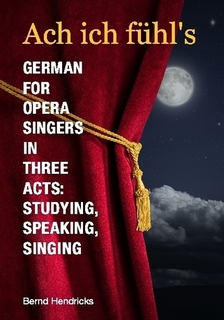Examine the aria “Sei’n wir wieder gut” – a warm-up for the upcoming workshop “Ariadne auf Naxos” on February 6th. More information below.

“Sei’n wir wieder gut” is an aria of the opera Ariadne auf Naxos by Richard Strauss. In it the character of der Komponist, performed by a mezzo-soprano, praises music as “the sacred one among the arts,” die heilige unter den Künsten.
He has endured some humiliation after he arrived at the palace of Vienna’s richest man. He was to present his opera seria “Ariadne auf Naxos,” when he learned that he has to share the stage and the performing time with the commeddia dell’arte troupe of the coquettish performer Zerbinetta. At first, der Komponist had refused, but then Zerbinetta persuaded him in the most flirtatious way to play along – successfully.
The tension falls away from his heart, when he proclaims to his impresario (der Musiklehrer) in an imperative, “Sei’n wir wieder gut.”
Vocabulary
die Tiefen (plural) = die Tiefe, noun created from the adjective tief (deep)
die Tiefe = depth
das Dasein = existence as a philosophical term; da (there, here) + sein (to be)
unermesslich = immeasurable, fathomless; messen = to measure
manches = some things, derived from the pronoun and the article word manch = some, e.g. manchmal = sometimes
unterlegen = here: to add text to music; legen = to lay, under = unter
recht gut = pretty good; recht stems from richtig = correct.
lieblich = lovely
fürchterlich = horrible, dreadful; die Furcht = fear
der Mutige = noun indicating a person and derived from the adjective mutig; a person who is courageous. In German we can derive a noun describing a person from any adjective: der Ungeduldige (the impatient one, male), die Schnelle (the fast one, feminine), du Guter (the good one, male)
versammeln = to gather (people); sammeln = to gather, collect things
The aria begins with an imperative; the Komponist addresses himself and his impresario, so, he has to conjugate the verb sein accordingly (for first person plural wir).
“Lets be good again!” The verb sein is irregular. In imperative: (du) sei, (Sie) seien Sie, (ihr) seid, (wir) seien wir
Ich sehe jetzt alles mit anderen Augen!
It continues with a statement of change and reconciliation, a phrase German-speaking people would say also today when they change their view on things.
“Now, I see everything with different eyes.”
Die Tiefen des Daseins sind unermesslich! Mein lieber Freund,
Es gibt manches auf der Welt,
Das lässt sich nicht sagen,
In a straightforward language, the Komponist ends the statement with a conclusive thought.
“The depths of existence are immeasurable! My dear friend, There are some things in the world That cannot be said. (Or: That cannot be expressed.)”
The combination reflexive + lassen + infinitive expresses a form of the passive voice when something can be done or is possible to be done. Das lässt sich nicht sagen = literally it lets itself not be said.
Die Dichter unterlegen ja recht gute Worte, recht gute.
– Jedoch, jedoch, jedoch, jedoch, jedoch! – Mut ist in mir, Mut, Freund!
The Komponist explains why some things cannot be expressed with words, which are after all the tools of poets. At first he praises the poets. They unterlegen (to add text to music or to highlight) pretty good words (recht gute Worte) but he modifies the praise with the particle ja, preparing the listener for an opposing or restrictive statement which opens with jedoch (however) – five times! “Courage is in me, courage, friend!”
Die Welt ist lieblich
Und nicht fürchterlich dem Mutigen.
This sentence begins and ends with a noun, and in between the Komponist describes how the world relates to the courageous person. To the courageous person, the world is lovely and not terrible.
The phrase fürchterlich dem Mutigen appears as dative. Der Mutige is the indirect object and therefore must be expressed as dative while the adjective belongs to the predicate of the sentence. (Die Welt ist lieblich und nicht fürchterlich.)
Und was ist denn Musik?
Now, the Komponist begins to muse about music and to praise music, here adding the intensifier denn, making this a rhetorical question.
Musik ist eine heilige Kunst zu versammeln
Alle Arten von Mut wie Cherubim
Um einen strahlenden Thron, das ist Musik.
The librettist von Hofmannsthal, chose a word order similar to English: “Music is a sacred art to gather all kinds of courage, like cherubim Around a shining throne; that is music.”
As in English, cherubim is plural for cherub, a biblical angel who guards paradise.
Und darum ist sie die heilige unter den Künsten.
“And therefore, it is the sacred one among the arts.”
The pronoun sie stands for die Musik. Please note that the Komponist does not say that music is the most sacred art. He says, there is only one art that is sacred: music.
Workshop “Seien wir wieder gut – The Linguistics of Ariadne auf Naxos”
Monday, February 6,
7 pm – 9 pm
Prachtwerk Cafe (Conference room), Ganghoferstraße 2, Berlin-Neukölln.
The event is free. Register at www.facebook.com/events/234371370305623/
The text of this article is an excerpt from the book “Ach ich fühl’s – German for Opera Singers in Three Acts: Studying, Speaking, Singing”.
More information about the book: Click.

3 thoughts on “Sei’n wir wieder gut: The Composer’s Relief”